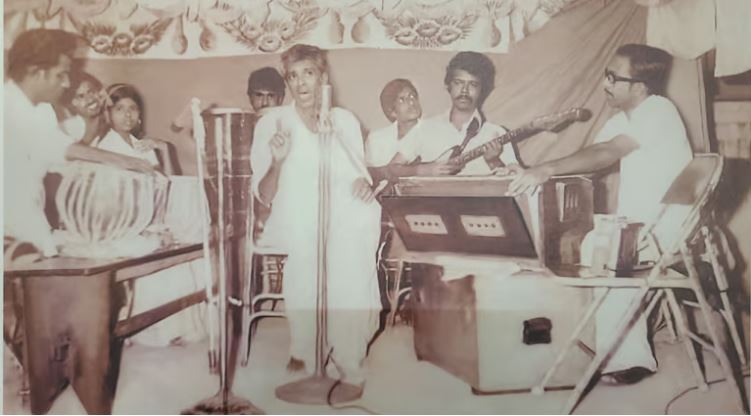
Mattanchery Gharana: Kochi sings in its own style no matter what genre is
text_fieldsBeing a cosmopolitan city of yesteryears, Kochi—an island area with a radius of 5 kilometres that roughly extends from Fort Kochi to Thoppumpady in Mattanchery—had seen traders, businessmen, and labourers flocking to the city from Kanyakumari to Kashmir in pursuit of their livelihoods. Years later, even though the richness and splendour of the city, once known as the business hub of Kerala thanks to the Cochin Port facilitating the import of goods and the export of spices and other locally grown produce, went into oblivion, the flock found the city a settling region. Now, it is home to people from all parts of the country—Gujaratis, Marwaris, Katchi Memons, Kashmiris, Tamilians, Konkanis, Deccanis, Punjabis, Anglo-Indians, and the list goes on. They speak their own dialects within their circles and within this land strip of a 5 km radius.
It is because of this ethnic and cultural diversity that the unique culture called Mattanchery culture in Kerala has emerged, giving music a particular place in their society," says K A Hussain, the secretary of Mehboob Memorial Orchestra. This distinctive musical culture has given birth to many singers and musicians in the region, including playback singers like Mehbood—referred to as Bhai by locals—Yesudas, musician late Zero Babu, Ibrahim Thuruthi, Kishore Abu, Cochin Azad, Afzal, and ghazal singer Umbay. The list doesn't end there, as young singers and musicians have also made their mark, contributing to the rich musical landscape. Innumerable musical groups, known as mehfils, took birth where people gathered to listen to their favourite songs, including Hindi and Urdu Ghazals, and Malayalam melodies. Some croon along with the singers, while others tap into the rhythms, creating a sprightly, rejuvenating atmosphere.
When the Cochin Port was at its zenith of cultural glory, the city would see musical legends from North India giving their performances, enchanting the crowd whose unending devotion to music would lead them to sacrifice whatever was dear to them. As mentioned before, it was the craving for music and songs among people from diverse backgrounds that led to the emergence of a musical group called Musical Meet in 1965, helmed by Advocate Abdul Khader, a man who loved music so much that he spent a good part of his earnings for the sake of music, as Hussain would testify. Under Abdul Khader Vakeel, as he was known – vakeel meaning advocate - the Musical Meet brought legends like singer Mohammed Rafi, Ravi Shankar, Allah Rakha Khan, Parveen Sultana, and Begum Akhtar to Kochi. In 1965, soon after the inauguration, the Mattanchery Town Hall witnessed these legends lending their musical prowess to a packed crowd.
In the early 1980s, another musical group called Raag emerged, touted as the first ghazal group in Kerala. It was formed by a group of young port labourers, including the popular ghazal singer, Umbayi. In 1985, Raag was rechristened as Mehboob Memorial Orchestra, in memory of playback singer Mehboob Bhai. Without mentioning his name, the history of Kochi's musical culture would be incomplete due to his immense popularity among Kochiites. Hussain credits the founding of MM Orchestra to the late Umbayi, along with others, for establishing the troupe that has since performed on innumerable stages across Kerala. The MM Orchestra initiated a musical event called 'Rafi Nite' in Kerala for the public in 1987. As with any other musical event, the Mattanchery Town Hall served as the venue for Rafi Nite, bringing together singers with a penchant for singing songs that have been infused with soul by Rafi from different parts of the country. Today, the venue has shifted to Ernakulum Fine Arts Hall, and the Rafi Nite, under the MM Orchestra banner, has been taking place in Kochi since 1987, except for the two years affected by COVID, according to Hussain.
The Orchestra and its activities need to be continued without any hindrance since it cuts across barriers of religion, colour, caste, and party, bringing people together under a culture that is music, says Hussain. 'We aim to encourage new talents and instil an impulse for music and its culture,' says Hussain. Helming the MM Orchestra since 1999 and being a septuagenarian, Hussain adds that now is the time to hand over the activities to the new generation, allowing them to carry it into the future. The MM Orchestra is also committed to providing space for more young generation singers and musicians, says Hussain.
Kochi, an ever-fertile ground for musical expression, has also witnessed the emergence of small mehfils such as Iqbal Music Academy, Mehfil-e-Khayal, Cochin Music Zone, and Mehfil Orchestra. These spaces have nurtured a new generation of talents, including Salaam Kochi, Thaajudheen, Yahiya Azees, and ghazal singer Rafeeque Yousuf.
In this city, where it is virtually impossible to find someone untouched by the magic of music, the legacy continues. The rich musical culture of Mattanchery persists and evolves, carried forward by a new generation of singers and musicians. As they take the stage, they not only enrich the musical heritage of the region but also ensure that the melodic saga of Mattanchery reaches new heights. In a city where diversity is harmonized through music, the story of Kochi's musical culture remains an ever-evolving symphony—a timeless masterpiece that resonates through the lanes of Mattanchery.






















